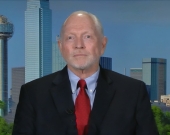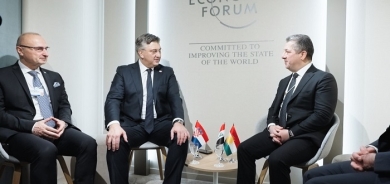Gulan Media Exclusive: Expert John A. Calabrese Delves into America's Foreign Policy Shifts and Challenges in a Transitioning World

Dr. John Calabrese is a renowned expert in international relations with a focus on the Middle East and Asia. He holds a Ph.D. in International Relations from The London School of Economics and serves as a professor at American University in Washington, DC. As the book review editor of The Middle East Journal and former director of MEI's Middle East-Asia Project (MAP), he has published extensively on the subject. Dr. Calabrese is the author of "China's Changing Relations with the Middle East" and "Revolutionary Horizons: Iran's Regional Foreign Policy," along with editing various books and contributing numerous articles. He has also co-directed the MEI-FRS project for the European Commission on Transatlantic Cooperation on Protracted Displacement, emphasizing the need for comprehensive strategies to address displacement crises.
In this insightful interview with renowned expert Dr. John A. Calabrese, we explore the significant changes in America's foreign policy under Donald Trump's presidency and its continued evolution during the Biden administration. Dr. Calabrese offers valuable insights into the shifts in US engagement with allies and strategic rivals, as well as the changing dynamics in the Middle East and the rise of China and Iran. Additionally, we gain a deeper understanding of the challenges the United States faces in the context of a transitioning world towards multipolarity. The interview sheds light on America's involvement in conflicts in Afghanistan and Iraq, as well as its relationship with the Kurdistan region. Dr. Calabrese's expertise provides a nuanced perspective on these complex international relations issues.
Gulan Media: Under Donald Trump's presidency (2017-2021), America's foreign politics underwent significant changes. The US seemed to adopt a different approach towards its allies, and President Biden's promise to reverse Trump's policies has yet to bring about substantial differences. How did Trump's presidency and the UK's departure from the EU contribute to these shifts in America's foreign policy?
John A. Calabrese: I am not entirely sure I understand the question. However, with all due respect, I disagree with the statement “President Biden's promise to reverse Trump's policies has yet to bring about substantial differences.”
To be sure, Russia’s invasion of Ukraine served as the catalyst for the closing of ranks between the US and its European partners. However, the Biden administration has deftly managed the response to Russian aggression, uniting and reenergizing the NATO alliance. These efforts made and results achieved by the Biden administration in galvanizing the Atlantic Alliance constitutes a "substantial difference" from the Trump approach and responses it evoked.
Similarly, Beijing’s “overreach” served as a catalyst, which coupled with the bold and creative diplomacy of the late Japanese Prime Minister Shinzo Abe breathed life into the “free-and-open Indo-Pacific” concept, which the Trump administration embraced. The Biden administration has built upon this foundation. US bilateral alliances with Japan, South Korea, Philippines, and Australia are stronger, not weaker since Biden entered the White House; moreover, the traditional “hub-and-spoke” structure of the US alliance system in Asia has been revised, with the creation and/or resurgence of “minilateral” groupings such as AUKUS and The Quad.
Gulan Media: Today's world is transitioning towards a multipolar state, marking the end of the era of a single superpower and the Cold War. Presently, the United States, through NATO, has provided substantial support to Ukraine in its conflict with Russia. Simultaneously, there appears to be a significant Cold War-like rivalry between the United States and China. Given these developments, can we conclude that the era of America as the dominant superpower has come to an end?
John A. Calabrese: Frankly, I have grown tired of the debates about US “decline” and the advent of “multipolarity”. But here are a few thoughts …
First, the US arguably reached the apex of its power around the turn of the 21st century. However, no serious person would regard the US attainment of that status -- or unipolarity -- to be the “norm” (i.e., a permanent feature) of international relations.
Second, the “rise” of China – and India – coupled with the increasing power and “agency” of so-called “middle powers” have combined to make for a much more complex geopolitical and geoeconomic landscape. Amid such changes, American leaders must perforce adjust their priorities, expectations, and the conduct of foreign policy. Above all, the US will have to reinvigorate the economy and find ways to address festering domestic and social problems. At the same time, the US will have to maintain close ties with traditional allies while developing flexible, issue-based partnerships with others to safeguard its interests and shape outcomes.
Third, i t is no longer realistic to regard the US as being the “dominant superpower.” Nor is assuring American “primacy” a realistic aim for US leaders to promote and seek to pursue. At the same time, though, it is important to recognize that the US has no peer in terms of “comprehensive power” in the current, transitional stage of world affairs, or what could be considered an era of “nascent multipolarity.” The US is a very large, prosperous, and resilient country -- possessing an abundance of resources and resourcefulness, as well as a capacity to generate support.
Gulan Media: Following the 1967 Six-Day War between Israel and Egypt, the United States emerged as the dominant superpower in the Middle East. The countries in the region became close allies of the United States. However, today we see the rise of powers like Iran and China, which have expanded their influence in business, politics, and stabilizing the Middle East. Does this signify America's retreat from the Middle East, and does it indicate the end of America's foreign policy engagement with the region?
John A. Calabrese: The level of priority the Middle East holds for the United States has declined. For well over a decade, the US has been shifting its strategic focus and reallocating resources to other regions, most notably the Western Pacific and, more broadly, the “Indo-Pacific.” The emergence of China as a “strategic competitor” and growing concerns about Chinese conduct across a wide range of issues has been primarily responsible for this change. Despite this shift and an assortment of policy differences with traditional partners in the region, the US still plays a major security role – including maintaining a strong residual military presence in the Gulf.
The US could, and arguably should think more creatively and work more assiduously to counter the perception that it is indifferent to developments in the region, unequipped to develop an agenda that features non-military tools, or less willing than in the past to fulfill its security and other commitments in the region. Over the past year, perhaps chastened by the adverse reception its rhetoric and policies garnered, the US has been more active on the diplomatic front. Yet, some critics argue that by being purposefully unambitious, the Biden administration has left regional problems to fester and China to exploit the situation.
Thus far, the Biden administration has taken a measured response to the expansion of China’s economic and political engagement in the region. In my opinion, Chinese engagement with the region represents a “threat” to the United States only to the extent that American officials come to regard the Middle East as an arena of zero-sum strategic rivalry. I do not believe they have yet fallen into this trap, and hope that they do not. After all, both the US and China have an interest in the stability of the Middle East
The expansion of Iran’s influence is another matter altogether and can hardly be considered a “stabilizing” factor in the region. Certainly, Iran’s neighbors do not regard Iran’s involvement in Lebanon, Syria, Iraq, or Yemen to be benign. Nor do US officials.
Gulan Media: Since 2001, the United States engaged in two major wars: one aimed at dismantling the Taliban regime in Afghanistan and the other targeting Saddam Hussein's regime in Iraq. However, the situation has evolved, with the Taliban regaining control in Afghanistan and Iran-aligned parties governing Iraq. What were the reasons behind the United States' decision to initiate these wars, and why did it face defeat in both instances?
John A. Calabrese: Some scholars have referred to the two wars – distinguishing between them – as a “war of necessity” (Afghanistan) and a “war of choice” (Iraq). I concur. Responding to the 9/11 terrorist attacks on the US homeland, the initial war aim in the case of Afghanistan was to destroy Al Qaeda (AQ) and oust the Taliban for having sanctuary for AQ. One could argue that this war was “justified” and deemed so by most members of the international community.
The Bush administration’s stated justification for launching the war in Iraq was to address the threat posed by the Saddam regime’s alleged possession of weapons of mass destruction (WMD) and reconstitution of WMD programs in contravention of United Nations Security Council resolutions – allegations that some contend were known to be false when made and were subsequently proven false. The notion of “preventive self-defense” adopted by the Bush administration did not enjoy widespread international support then, nor since.
Judged by their initial war aims, the US military interventions in Afghanistan and Iraq were reasonably successful. Both incumbent regimes were swept from power in relatively short order. However, in the case of Afghanistan, AQ was never “destroyed” as such – perhaps signifying that a terrorist network cannot be extinguished by military means alone, though it also bears mentioning that finding refuge in Pakistan clearly contributed to AQ’s survival and that of the Afghan Taliban. The reasons for the subsequent US “failure” in Afghanistan are the subject of a burgeoning literature and competing narratives. The same can be said for the case of Iraq, where the US war effort went well but the postwar effort was a debacle.
Gulan Media: After the United Nations Security Council Resolution 688 in 1991, which aimed to provide humanitarian support ("Operation Provide Comfort"), the Kurdistan region of Iraq became allies with the US in 2003 for the removal of Saddam Hussein, and again in 2014 against ISIS. The question is, how crucial is it for the US to protect Kurdistan, and is it willing to provide a level of protection similar to that of Taiwan?
John A. Calabrese: I have long regarded the US “official” relationship with Iraqi Kurds as being driven by a combination of an alignment of interests, expediency, and empathy.
In my opinion, Operation Provide Comfort was motivated chiefly by a sense of moral obligation and common humanity, though geopolitical considerations were not irrelevant.
During the war to oust Saddam Hussein from power and later in the fight against ISIS, US and Iraqi Kurdish interests were tightly aligned – the geopolitical motivations were ascendant.
However, US-KRG relations have not always been smooth sailing. Unless I am mistaken, Washington has never been an enthusiastic champion of Kurdish self-determination and has exhibited a strong preference for Iraq’s unity and territorial integrity over Kurdish independence.
In this respect – that is, in its opposition to Iraqi Kurdish independence – the US posture broadly resembles its stance on Taiwan, where American officials do not support a unilateral alteration of the status quo whether by force (in the case of Mainland China) or a declaration of independence by the Taiwanese government.
As for “protection,” the stakes for the US are far higher in the case of Taiwan than they are in the case of Iraqi Kurdistan. Furthermore, unlike in the case of Taiwan, it is not clear that any of the regional actors – Turkey? Iran? – or GOI in Baghdad seems inclined to pursue “reunification” (i.e., absorb) the KRG, thereby testing Washington’s level of commitment to its Iraqi Kurdish partners.















